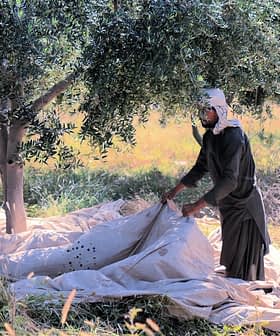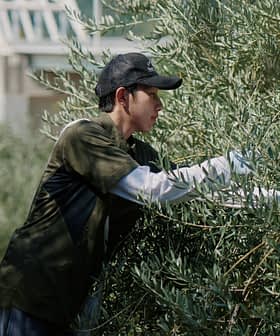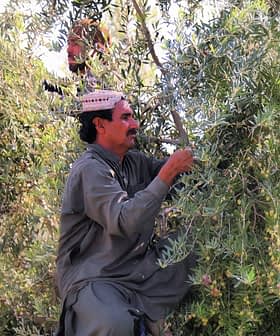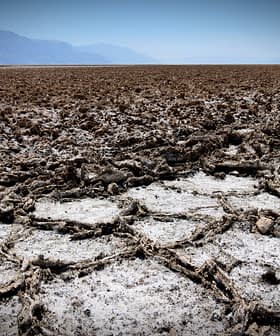 10.1K reads
10.1K readsBusiness
Pakistan Set to Become Olive Council Member
Pakistan has joined the International Olive Council to enhance its olive oil production and is working towards planting tens of millions of trees to become a significant olive oil producer in the region. The country is implementing a nationwide effort to expand local olive production, with plans to add 10 million new olive trees in the next three years, focusing on underprivileged areas and utilizing both traditional farming and modern techniques.
Pakistani government representatives met with officials from the International Olive Council (IOC) in Madrid recently to announce that the South Asian country will become its 19th member.
The IOC’s goal is to plant tens of millions of trees and make Pakistan a relevant olive oil producer in the region. The country is already involved in a multi-year nationwide effort to expand local olive production.
Pakistan has real potential and adequate human resources to succeed in its olive sector development plan.
According to local officials, Pakistan has the potential to produce 1,400 tons of olive oil annually based on current olive plantations. This figure is expected to continue to rise as more trees are planted.
“Pakistan feels the need to connect with the council as they are developing their olive sector and their internal olive oil consumption grows,” Abdellatif Ghedira, the IOC’s executive director, told Olive Oil Times.
See Also:Olive Cultivation Is Expanding in Georgia“In Pakistan, olive oil culture is making inroads, and so are the opportunities related to that,” he added. “The council is a decisive player in contributing to the sustainable and responsible development of olive growing, and it serves as a world forum for discussing policymaking issues and tackling present and future challenges.”
The nationwide Ten Billion Tree Tsunami project launched by the government to tackle some of the effects of climate change such as soil erosion and desertification complements the olive expansion projects meant to bring new opportunities to farmers.
The reforestation project, considered by the United Nations one of the most ambitious on a global scale, aims at restoring and enhancing more than one million hectares of forest by the end of 2023.
Today Pakistan’s forest covers only five percent of the country, compared with a 23 percent global average. Planting fruit tree crops, such as olives, is an environmentally and economically-friendly way to achieve this goal.
The second phase of the national olive project, which started 12 years ago, will add 10 million new olive trees in the next three years.
Given the unique characteristics of the olive tree, often thriving in areas way more challenging for other crops, government officials believe that olive farming is an efficient answer both to reforestation needs and economic development.
“A special focus in this phase will be given to underprivileged areas of the country, such as Southern Balochistan, Southern Punjab, the tribal areas of Khyber Pakhtunkhwa and some parts of Sindh province,” Muhammad Tariq, national project director at the Ministry of National Food Security and Research, told Olive Oil Times.
Thanks to cooperation projects with some of the IOC’s European members, such as Spain and Italy, and with foreign support from China, local growers are experimenting with many different olive varieties, such as Pendolino, Frantoio, Picual and Arbequina.
Many are also growing a locally-bred olive variety. A network of new laboratories, olive tree nurseries and processing infrastructures, such as mills, is being expanded in many rural areas too.
Local experts explained that traditional farming and modern techniques would bring large portions of land to productivity, creating job opportunities and economic growth. Drip irrigation systems cover over 16,000 hectares and 3.6 million olive trees.
The Pakistani public and private sectors maintain 26 olive oil extraction plants of different capacities, from 80 kilograms per hour to 600.
“The location of the plants is such to cover the needs of the olive plantation areas,” Tariq said. “In the phase-II olive program, six new extraction units with a 350 kilograms per hour capacity will be installed by the private sector in Punjab, Khyber Pakhtunkhwa and Balochistan.”
More than 12 olive nurseries also are working in the public and private sector registered with the Federal Seed Certification and Registration Department of the government of Pakistan.
See Also:Uzbekistan Joins Olive Council“Some of these nurseries have their own bud-wood mother blocks, or they get it from other registered bud-wood mother blocks,” Tariq said. “However, the main propagation method is through cuttings which have a lower success rate in producing olive nursery plants indigenously.”
The Pakistani government has installed 12 double-shaded nursery tunnels with the usual facilities such as a mist system, temperature control and an internal drip irrigation system to improve the success rate.
“The major benefit of these nurseries will be producing certified olive nursery plants for achieving self-sufficiency in the sector,” Tariq said.
“It is beyond any doubt that cooperation from the International Olive Council in lieu of technology transfer, research grants, innovations and other related areas will help a great deal in boosting the olive sector in Pakistan,” he added.
In Pakistan, the International Olive Council (IOC) is active in several aspects of the olive development process.
“The IOC encourages international technical cooperation on research and development projects, training and transfer of technology,” Ghedira said. “It enhances the environmental impact of olive growing and the olive industry. It also promotes world consumption of olive oil and table olives through innovative campaigns and action plans.”
Ghedira led an official IOC visit to Pakistan last November to witness the olive sector development plans, confirm the government’s intention to join IOC and monitor the implementation of IOC standards.
“Discussions focused on the positive impact of the IOC’s mission to Pakistan, the various meetings with the Pakistani authorities and private sector stakeholders and the visits to different regions of the country,” Ghedira said.
“They concluded that Pakistan has real potential and adequate human resources to succeed in its olive sector development plan while pointing out that technical training is necessary before starting this plan to adopt good practices and avoid costly rectifications after the fact,” he added.
Tariq underlined how relevant the interest of farmers throughout the country is proving.
“They are interested in getting olive trees as this sector is in a development stage,” he said. “Training programs on different aspects of the olive value chain, including nursery management, orchard management, pre- and post-harvest value addition and oil processing, are being arranged regularly in all provinces.”
“A major focus of this training is to empower youth and gender in the olive sector for employment generation to uplift the social sector in underprivileged areas,” he added.









